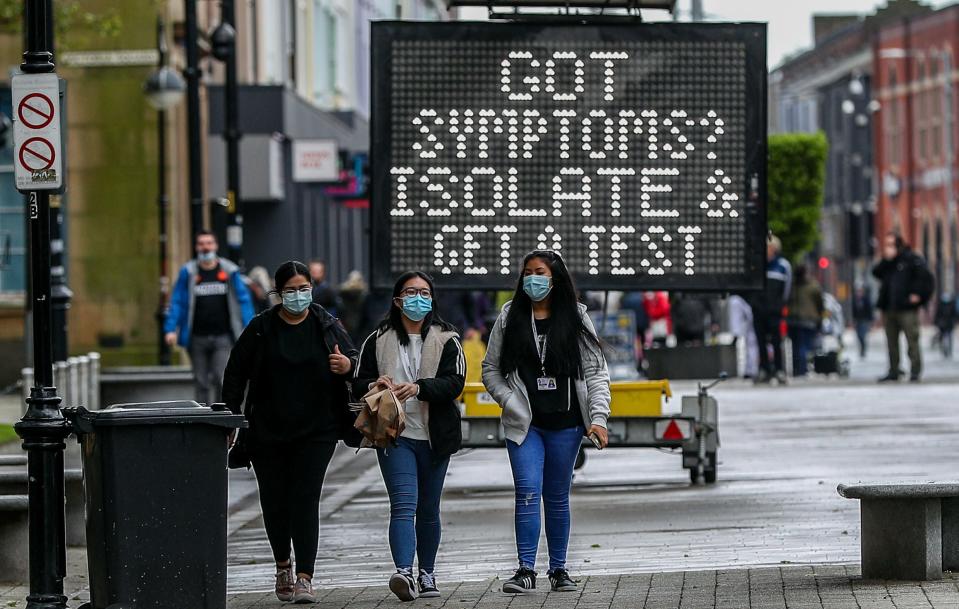Covid infection rate up by three-quarters in one week

Covid infections are rising across the UK
(PA)The number of coronavirus infections in the community has almost doubled in a week, according to the latest data from the Office for National Statistics (ONS).
The ONS said that for the week to 29 May, 85,600 people in England had the virus, equivalent to one in 640 people. This is up from 48,500 people, or one in 1,120, the previous week.
It is the highest level of community infections since the week ending 16 April.
It comes as a group of experts urged Boris Johnson to “pause” the lifting of the final Covid restrictions on 21 June in order to avoid a lockdown at a later point.
In a statement, Independent Sage said there was increasing evidence that the so-called “Delta variant” has “spread widely across the UK and is continuing to spread, that it has higher infectivity than the previous circulating variant, and that it is more likely to cause disease and hospitalisation”.
The group added: “There is increasing evidence that vaccine efficacy is compromised against this variant, and that individuals remain at particular risk until they receive two doses.
“There is some evidence that protection from two doses wanes after a number of months, particularly in the elderly. Meanwhile, cases are surging in school-aged children, and spreading into the community, particularly amongst those yet to be fully vaccinated. It is clear that the link between infection and hospitalisation has not yet been fully broken.”
The numbers of patients being admitted to hospital across England with Covid appears to be holding steady. The latest internal data shared with The Independent showed that there were 803 patients in hospital overall, up from 779 on Thursday. On Wednesday, the figure was 801. Although there were more than 50 new admissions to hospital for patients with Covid, the NHS discharged 90 patients in the past 24 hours.
In Bolton, one of the hotspot areas hit by the Delta variant, patient numbers in hospital have fallen successively every day since last Thursday. There are 34 patients in hospital with Covid, down from 49 last week. Although the hospital has seen three new admissions with Covid in the past 24 hours, it has discharged eight patients.
The ONS said the percentage of people testing positive has increased in those aged 35 years and over, and in school children aged 11 and over.
Across the country, the percentage of people testing positive for Covid-19 increased in the northwest, the east Midlands and the southwest.
There were also signs of a rise in the West Midlands and London, while the trend is uncertain for other regions.
In most regions, positivity rates are very low, meaning trends are difficult to identify since they are affected by small changes in the number of people testing positive from week to week.
The northwest had the highest proportion of people of any region in England likely to test positive for coronavirus with about one in 280 infected.
The southeast had the lowest estimated level, at about one in 1,490.
In Wales, there are “early signs” of an increase in the percentage of people testing positive for the coronavirus, with about one in 1,050 people estimated to have had Covid-19 in the week to 29 May, the ONS said.
In Scotland, there have been two deaths of coronavirus patients and 992 new cases in the past 24 hours, taking the death toll to 7,676.
The first minister, Nicola Sturgeon, said the daily test positivity rate was 3.9 per cent, up from 2.8 per cent the previous day.
Sarah Crofts, head of analytical outputs for the Covid-19 infection survey, said: “Our figures today show a mixed picture across the UK. Although infections remain low, the percentage of those testing positive for Covid-19 has increased slightly in England and we are seeing early signs of an increase in Wales. The trends are uncertain in Northern Ireland and Scotland.
“We are also seeing an increase in England in the percentage of cases compatible with the Delta variant first identified in India.
“Analysing these trends will be key over the next few weeks as we monitor the impact of the variants in different regions.”
Separately, the coronavirus reproduction number, or R value, in England is between 1 and 1.2, according to the latest government figures.
Last week, it was between 1 and 1.1.
This represents the average number of people each Covid-19 positive person goes on to infect, with anything above 1 meaning that the virus is growing exponentially.
An R number between 1 and 1.2 means that every 10 people infected will infect between 10 and 12 other people, on average.
Imperial College expert Professor Neil Ferguson, one of the architects of the first lockdown, warned that overall UK data on the spread of the virus was heading in a “negative direction”.
He said the Delta variant could be “between about 30 and maybe even up to 100 per cent more transmissible” than previous iterations of the virus.
“We haven’t yet been able to pin down how it translate into hospitalisations," he told the BBC.
“We’re seeing an uptick in hospitalisations in the northwest, and a couple of other areas, but it’s too early to say, and that’s critical because we do expect vaccines to give a high level of protection still, but exactly how high – it’s critical to what size third wave we might see.”
The government is yet to decide how to react to the spread of the new variant and whether the 21 June lifting of all restrictions should take place, but The Daily Telegraph reported that ministers could continue to recommend home-working.
Read More
UK Covid-19 vaccinations: Latest figures
Nearly 400,000 people still have long Covid a year after initial infection, new stats show
Why are we so bad at calculating risk?

 Yahoo Finance
Yahoo Finance 